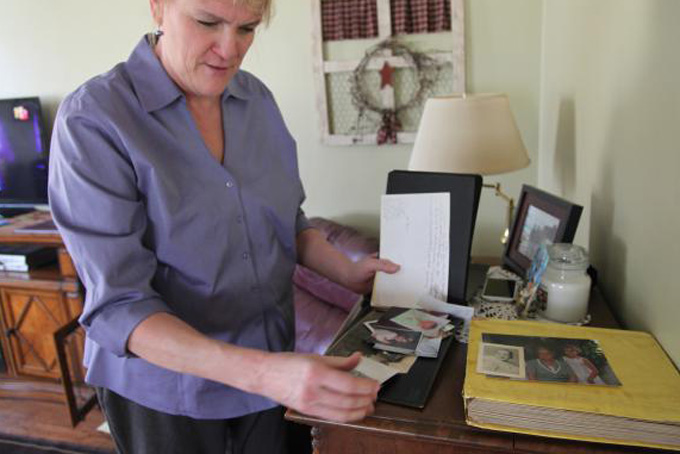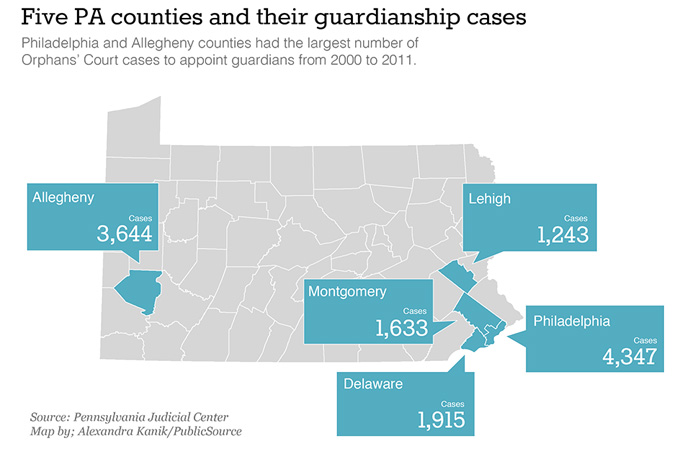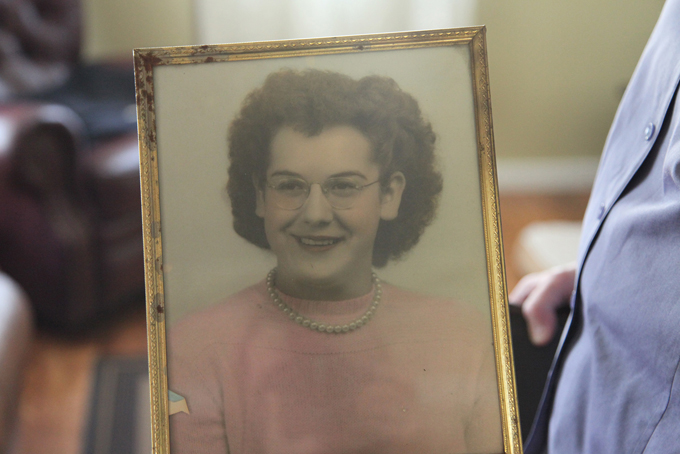
Norma Carpenter, a nurse and school board member, visited her 82-year-old mother regularly at a personal care home in Indiana County. The two would walk hand in hand through the home, stopping to hug each other. (Photo by Halle Stockton/PublicSource)
Norma Carpenter, a nurse and school board member, visited her 82-year-old mother regularly at a personal care home in Indiana County. The two would walk hand in hand through the home, stopping to hug each other.
Then, in October 2012, Norma was banned from visiting or calling her mother, Mary Little, who has dementia. Her visits, she was told, left her mother sad and depressed.
In December, Norma discovered that her mother had been moved nearly 100 miles away to a Fayette County nursing home.
All of these decisions were made by a court-appointed guardian.

“It’s terrible. I mean, you can’t see the person who loved you and raised you and she needs us now more than ever,” Norma said.
Pennsylvania is fourth in the country in terms of its elderly population, and as the state’s more than 3.3 million Baby Boomers join the ranks of the elderly, state courts and welfare systems will be put to the test. Guardianships are especially open to abuse because there is little regulation or oversight.
Examining guardianship is a priority in the state, with both the Pennsylvania Department of Aging and the Supreme Court of Pennsylvania conducting studies. While guardianships are needed for those who can no longer care for themselves, they also require individuals to surrender all their rights — in some cases to a total stranger.
Norma said she was elbowed out of being her mother’s caregiver because of a feud with her brother. She is not alone.
Does your loved one have a court-appointed guardian? Share your experience.
Guardians are often appointed for the elderly or disabled because of family squabbles. And for many, the conflicts are never resolved.
In Norma’s case, an Orphans’ Court judge in Indiana County appointed Distinctive Human Services, a nonprofit agency in Johnstown, as guardian for Mary.
From there, an agency caseworker had the power to decide where she lived, what she ate, what medical treatment she received, and who she saw.
Ellen Hamilton, executive director of Distinctive Human Services, said all the measures taken were in Mary’s best interest and that Norma is now allowed supervised visits.
“You’ve got an elderly, frail woman who’s being torn between children, who has had her life turned upside down and thrown all about the neighborhood,” Hamilton said. “She doesn’t know how to make this controversy end.”
The National Center for State Courts estimated there were 1.5 million active guardianships in the U.S. in 2011. In Pennsylvania, the courts decided more than 30,000 guardianship cases between 2000 and 2011.

Norma holds up a portrait of her mother, Mary Little, in her youth. Little, now 82 and suffering from dementia, was placed in a nursing home by a legal guardian. (Photo by Halle Stockton/PublicSource)
Some cases reviewed by PublicSource show the difficulties that guardianships often bring. According to court documents and personal accounts:
In late 2007, two of Rita Denmark’s children filed for guardianship of their mother in different states — one in Pennsylvania, where Rita was a lifelong resident, another in Florida. The dispute came to a head while Rita, who has dementia, was visiting her son in Florida. Attorneys suggested an independent guardian serve for a short time. Now, Rita has been a ward of a guardian in Port Orange, Fla., for more than five years. Her daughter, Holly Peffer of McKean County, has been trying to bring her 82-year-old mother home.The guardian has billed nearly $94,000 from Rita’s estate. “I had no idea how dangerous guardianship was,” Holly said.
Three people brought Grace Connors, who was suffering from dementia, from California to Pennsylvania in 2001. One of them obtained a fraudulent power of attorney to control her assets. Daughter Mary Claire Connors, who had cared for her mother in California, traveled east to reclaim her, but a Luzerne County judge appointed a nonprofit agency as guardian. Mary Connors said that, under guardianship, her mother’s estate was depleted and she was not allowed to visit without supervision. She said she spent at least $100,000 and went bankrupt trying to get her mother back. Grace died in 2006 at age 85. Guardianship, Mary said, is “ownership of a human being …. There is no escape.”
Problems can also occur when the guardian is a family member. Shelley Kuziak of Columbia County said she was the primary caregiver for her mother, Miriam Kuziak, for several years. But Shelley’s sister became guardian in 2006. The sisters’ opinions on how to care for their mother differed. Shelley said she repeatedly fought in court for visitation after being accused of coercing her mother to accept medical treatment. She said she was not permitted to visit her mother in the years leading up to her 2008 death at age 77.
Elaine Renoire, president of the National Association to Stop Guardian Abuse, said the group hears stories daily about people who can afford home care being forced into facilities and their assets liquidated; wives being denied a say in the medical treatment of husbands; and family photos and heirlooms trashed or sold.